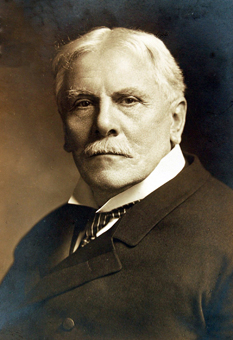Scofield Papers
Cyrus Ingerson Scofield was born August 19, 1843 in Michigan. He became a Christian in 1879 and was licensed to preach the next year. Scofield accepted a call in 1883 to pastor a small mission, First Congregational Church in Dallas, Texas. Scofield's church in Dallas grew from fourteen to over eight hundred members by the time he left in 1895 to become pastor of D. L. Moody's church, the Trinitarian Congregational Church of East Northfield, Massachusetts. Scofield returned to pastor his church in Dallas from 1903 to 1909, but was often absent preparing the very popular Scofield Reference Bible, which was first published in 1909 by Oxford University Press. Scofield moved to New York, where he remained active despite poor health. In 1914 he helped found the Philadelphia School of the Bible. Among his many accomplishments, Scofield helped organize the Central American Mission, now CAM International, and developed a Bible correspondence course, which was later administered by Moody Bible Institute. Over the years he was a regular speaker at Bible conferences, such as Niagara and Northfield. Scofield died July 24, 1921. His study Bible, correspondence courses, involvement in missions, and many speaking engagements had a significant impact on evangelical Christianity.
The Archives of Dallas Theological Seminary has a few collections related to C. I. Scofield. Although small, they have significance because original resources about Scofield are limited and housed in several different repositories. In Fall 2005, Dr. William A. BeVier donated his correspondence and copies of resources he collected while writing "A Biographical Sketch of C. I. Scofield", his master's thesis at Southern Methodist University in 1960. In 2002 the seminary received a donation of fifteen letters (forty six leaves) C. I. Scofield wrote to Frank W. Boyle, a pastor Scofield mentored. Another collection consists of photocopies of documents at Scofield Memorial Church concerning Scofield and L. S. Chafer. Records for these collections are searchable in the library's online catalog and unpublished finding aids are available in the archives.

 dts.edu
dts.edu